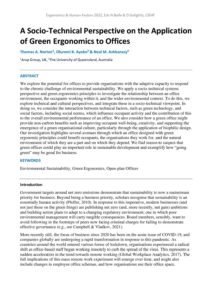| Document | Author Thomas A. Norton, Oluremi B. Ayoko & Neal M. Ashkanasy |
| Abstract We explore the potential for offices to provide organisations with the adaptive capacity to respond to the chronic challenge of environmental sustainability. We apply a socio-technical systems perspective and green ergonomics principles to investigate the relationship between an office environment, the occupants working within it, and the wider environmental context. To do this, we explore technical and cultural perspectives, and integrate these in a socio-technical viewpoint. In doing so, we consider the interaction between technical factors, such as green technology, and social factors, including social norms, which influence occupant activity and the contribution of this to the overall environmental performance of an office. We also consider how a green office might provide non-carbon benefits such as improving occupant well-being, creativity, and supporting the emergence of a green organisational culture, particularly through the application of biophilic design. Our investigation highlights several avenues through which an office designed with green ergonomic principles could benefit occupants, the organisations they work for, and the natural environment of which they are a part and on which they depend. We find reason to suspect that green offices could play an important role in sustainable development and exemplify how “going green” may be good for business. |

